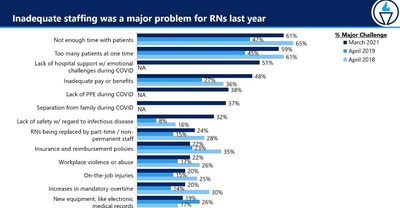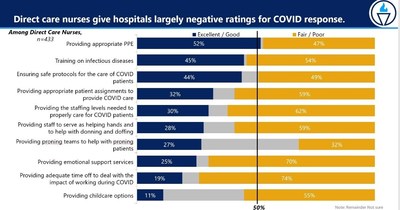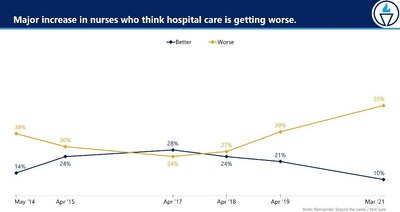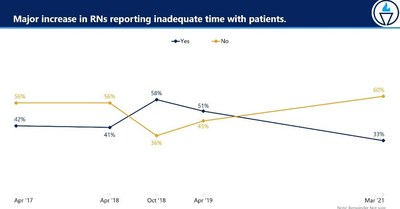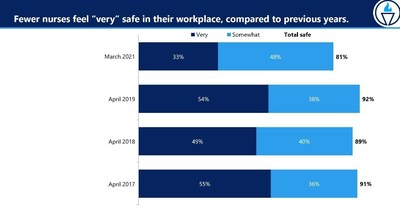Subjects: NPT, SVY, AVO
As National Nurses Week Begins, 'State of Nursing in Massachusetts' Survey Shows Existing Quality of Care, Staffing and Safety Problems Worsened by Inadequate COVID-19 Preparedness and Lack of Support for Frontline Healthcare Workers
CANTON, Mass., May 6, 2021 /PRNewswire/ -- A survey of more than 500 registered nurses published at the beginning of National Nurses Week shows that during the COVID-19 pandemic nurses experienced a major downturn in patient care quality in Massachusetts hospitals as troubling trends such as unsafe patient assignments, diminished time with patients and a lack of workplace safety grew worse.
"The State of Nursing in Massachusetts," a randomized survey of Massachusetts RNs conducted March 25 to March 30 by Boston-based Beacon Research, shows that the pandemic has exacerbated additional existing problems within the Massachusetts healthcare system, including mental health boarding in emergency departments, nurse burnout and turnover, and a lack of support for healthcare staff from employers. Email [email protected] for a copy of the survey results and charts.
"The COVID-19 pandemic has intensified longstanding problems in our healthcare system that threaten the safety of patients and nurses," said Katie Murphy, a practicing ICU nurse and president of the Massachusetts Nurses Association.
"The corporate takeover of healthcare, whether by for-profit companies or enormous non-profit organizations that pay their executives millions, has hurt the ability of frontline nurses and healthcare workers to provide the quality of care our patients deserve," Murphy said. "The 'State of Nursing in Massachusetts' survey gives voice to those concerns and shows that our corporatized healthcare system was woefully unprepared for a crisis like the pandemic."
The "State of Nursing in Massachusetts" demonstrates strong support among nurses for addressing issues that MNA nurses and healthcare professionals have proposed tackling through state legislation proposed during the 2021-2022 term, including presumption of workplace COVID-19 infection, personal protective equipment (PPE) data transparency, workplace violence prevention, independent studies of the nursing workforce, essential services protections, and a measure to relieve emergency department overcrowding by behavioral health patients.
Nurses from all types of healthcare settings were involved in the survey, including teaching hospitals, community hospitals, non-hospital settings and non-direct patient care. A plurality of nurses who responded (45%) worked in hospitals and most (58%) were not MNA members. The vast majority of nurses (76%) said they support the strike by St. Vincent Hospital nurses over unsafe staffing at their Worcester Hospital, including 69% of non-MNA nurses.
Hospitals Unprepared for COVID-19 as Nurses Report Being Infected at Work and EDs Overcrowd with Boarding Patients
The COVID-19 pandemic has hit nurses particularly hard. A Mass General Hospital study found frontline healthcare workers were at a nearly 12 times higher risk of testing positive for COVID-19 compared with individuals in the general community. Nearly 20% of nurses who responded to the "State of Nursing in Massachusetts" survey said they have contracted the coronavirus, and 37% said they are likely to leave the profession sooner because of the impact of COVID-19.
Among those who contracted the virus, 76% said they had definitely or probably acquired it at work, which corresponds with studies showing that a lack of proper PPE has made healthcare workers more at risk for infection.
"Healthcare workers have been on the frontlines of the COVID-19 pandemic since day one," MNA President Murphy said. "Nurses have worked without the appropriate protective equipment, without adequate testing of patients and in facilities that were slow to implement policies and procedures to slow the spread of the virus. Yet healthcare employers refuse to recognize these risks for their own financial gain instead of providing the benefits and support that nurses need to recover and keep their families safe."
MNA legislation on this topic would presume that any frontline healthcare worker who contracts COVID-19 acquired it at work. It would also prohibit employers from requiring healthcare workers to use their own sick time, vacation time or other PTO to quarantine, treat or recover from COVID-19. At least fourteen other states have acted on occupational presumption and COVID-19.
Nurses reported feeling much more supported by friends and family (92%), co-workers (92%), and Massachusetts residents in general (73%) than by the hospital industry (37%) during the pandemic. They also described a range of hospital preparedness problems:
The pandemic has also greatly exacerbated emergency department boarding, according to the survey. Emergency departments across the state were already overburdened by mental health patients waiting for beds before COVID-19 hit. In a 2018 state study, 155 mental health patients waited at least 96 hours in EDs over four months. Half of the patients were children. Behavioral health patients accounted for 14% of overall ED visits but 71% of ED boarding, according to a 2017 Health Policy Commission report.
In "The State of Nursing in Massachusetts," 68% of nurses said they saw increased boarding for children and adults in emergency departments during the pandemic. The MNA has proposed addressing this problem in multiple ways. One bill would create a pilot program at Taunton State Hospital to transfer medically stable, high acuity behavioral health and dual diagnosis patients away from overcrowded emergency departments until such time that an appropriate placement for treatment is found.
Another MNA bill would strengthen existing hospital closure law to address the epidemic of at least 40 hospitals and/or hospital units that have closed since 2009, leaving patients and their families without local essential services, especially mental health units, maternity units, and emergency departments. A further protection would be legislation prohibiting the closure of beds, units or facilities for the duration of the novel coronavirus public health crisis.
Nurses Describe a Staffing Crisis Getting Worse
Fifty-five percent of nurses surveyed said hospital care is getting worse, compared to only 10 percent who said it is improving. This is a significant acceleration of a trend seen in previous "State of Nursing in Massachusetts" surveys. Since 2014, with only one exception in 2017, more nurses have reported care is getting worse rather than better. This year the number of nurses concerned about care quality exploded.
Closely linked to the diminishment of care quality is time nurses are able to spend with patients. Nearly twice as many nurses (60%) reported not having enough time with their patients as those who felt they had adequate time (33%). This problem saw a marked increase from the 2019 survey, when 47% said not having enough time with patients was a major challenge.
The largest reported obstacles to providing quality care to patients ? suggested by nurses without prompting ? were understaffing (30%), nurse to patient ratio (15%), lack of assistance/staff (9%) and lack of time to spend with patients (9%). Nurses also reported significant issues related to unfilled positions, with 65% saying RN positions have been left vacant compared to 50% in 2019.
Decades of research have proven the connection between inadequate nurse staffing and negative patient outcomes. To provide additional information to help address the worsening staffing crisis, the MNA has proposed the creation of an independent legislative commission to conduct studies on the state of nursing in Massachusetts. The Workforce Development and Patient Safety Act (S. 154/H. 113) is sponsored by Senator Diana DiZoglio and Representative Dan Ryan. The bill would:
- Examine the makeup of the current nursing workforce.
- Determine the nursing needs for the Commonwealth over the next several decades.
- Provide an independent, evidence-based analysis of issues affecting the RN workforce, including but not limited to workplace staffing, violence, injuries and quality of life.
- Use the results of these studies to determine the path forward for setting safe patient limits in MA acute care hospitals to ensure optimum patient care.
Hospital executives have long claimed there is a shortage of nurses to avoid implementing safer staffing levels. This is not true, as evidenced by independent studies and the experience of Massachusetts nurses. Massachusetts has the highest percentage of nurses working per diem or part time in the nation. The MNA has surveyed those nurses and most say they would increase their hours if safe staffing were in place, which would be equivalent to more than 2,000 RN positions. According to the Board of Registration in Nursing, Mass. nursing schools graduate an average of 3,500 graduates per year. Many of those nurses leave our state because hospital executives refuse to hire them or refuse to post permanent or full-time roles.
Nurses Feel Less Safe in the Workplace During COVID-19
Another area in which an existing problem in the healthcare system was made worse by the pandemic is workplace violence. Prior to COVID-19, according to the Bureau of Labor Statistics, about 50 percent of all workplace assaults occur in the health care setting. A National Nurses United survey in late 2020 found that around 20 percent of nurses report facing increased workplace violence on the job, which they attribute to decreasing staffing levels, changes in the patient population, and visitor restrictions.
Fewer Massachusetts nurses surveyed in March reported feeling "very" safe in their workplace (33%) than at any time in the last four years. Nearly 60% reported personally encountering at least one instance of workplace violence or abuse in the past two years. At high rates (63%) nurses in community hospitals reported violence as a serious problem over the past two years.
MNA legislation entitled An Act Requiring Healthcare Employers to Develop and Implement Programs to Prevent Workplace Violence would require healthcare employers to perform an annual safety risk assessment and, based on those findings, develop and implement programs to minimize the danger of workplace violence to employees and patients. It would also provide time off for healthcare workers assaulted on the job to address legal issues and require semiannual reporting of assaults on healthcare employees.
"We know violence escalates during emergencies and the pandemic placed incredible pressure and risk on nurses and healthcare professionals," said Karen Coughlin, a registered nurse who worked for the Department of Mental Health for 34 years and is an MNA board member who specializes in workplace violence advocacy. "This legislation has broad, bipartisan support, including the backing of frontline nurses across the state. No matter where someone works in health care or where someone seeks care, they deserve to be safe."
Additional Survey Details
Respondents were randomly selected from a complete file of the 100,000 nurses registered with the Massachusetts Board of Registration in Nursing, and geographic quotas were used to ensure accurate representation across all regions of the state. Nurses were contacted through text and the survey was completed online on their phone or computer.
Screening questions were used to verify that respondents were registered nurses working in Massachusetts. Slight age and care setting (teaching hospital, community hospital, non-hospital care) weights were applied to ensure the data accurately matched demographic information available on the statewide list of nurses and the actual breakdown of healthcare facilities across the state.
A total of 503 interviews with Massachusetts nurses were completed as part of this survey. Questions have a margin of error of ±4 (at the 95% confidence level).
MassNurses.org ? Facebook.com/MassNurses ? Twitter.com/MassNurses ? Instagram.com/MassNurses
Founded in 1903, the Massachusetts Nurses Association is the largest union of registered nurses in the Commonwealth of Massachusetts. Its 23,000 members advance the nursing profession by fostering high standards of nursing practice, promoting the economic and general welfare of nurses in the workplace, projecting a positive and realistic view of nursing, and by lobbying the Legislature and regulatory agencies on health care issues affecting nurses and the public.
SOURCE Massachusetts Nurses Association
These press releases may also interest you
|
News published on and distributed by:


